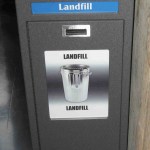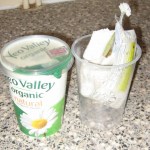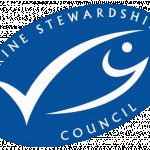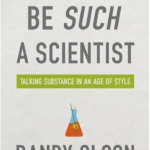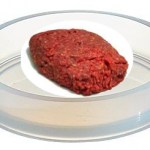
I have decided to add a new category on greenwashing. It's so prolific, we simply must have some displayed here on Guilty Planet. I am in favor of companies doing the right thing and I imagine that Nature's Path is up there as earth-friendly business models go. But I am worried about the proliferation of messaging without meaning.
This is a new trash can in the Environmental Sciences building at Western Washington University. I like the "landfill" label.
Myopic spot-prawn lovers might not like the idea of closing some of the oceans to fishing, but California is creating a network of marine protected areas (MPAs) along its coast for one simple reason -- MPAs work. Research by Callum Roberts et al. (2001) published in Science found:
a network of five small reserves in St. Lucia increased adjacent catches of artisanal fishers by between 46 and 90%, depending on the type of gear the fishers used. In Florida, reserve zones in the Merritt Island National Wildlife Refuge have supplied increasing numbers of world record-sized fish to adjacent…
In North America, we have thick plastic yogurt containers (come to think of it, we have thick yogurt, too) that one could use over and over and over again (except almost no one does). I don't understand why we don't do it like they do in the UK, where they have these really thin plastic containers that are sheathed with cardboard labels. It seems to me that there is overall less waste and both container and label can be recycled.
A classically held anthropological view is that "shame results from a public exposure of some impropriety or shortcoming whereas guilt results from more private events."
I concur with the anthropological notion that shame is the more public emotion (and also, that shame is likely a more primitive emotion that served adaptive functions in early developmental stages) and that is the definition that I will adhere to on this blog. In other words, the shame I will refer to is closely related to embarrassment (which distinctly depends on social disapproval, although embarrassment is often related…
My former supervisor/now boss (and OG of overfishing) has a piece out in The New Republic with the wonderfully garish title of Aquacalypse Now. He explains how the fishing industry can contribute a minuscule amount to the GDP of advanced economies -- less than hair salons -- and yet manage to wield a disproportionate amount of political power. Read the whole article here but beware: NOTHING is as bad as harpooning a manatee.
Greenpeace International is creating a series of animated films to generate interest in their global marine reserves campaign. I like the commentary on technological efficiency, especially the bit about the "ice and dice aerial trawler", in their first piece. See what you think:
There is a reason people are pushing for increased marine protected areas (which currently protect less than 0.1% -- yes, that decimal place is supposed to be there -- of our ocean from fishing). MPAs work. That's why in California they passed legislation ten years ago to create an underwater national park system. Now, finally, the project is underway. But not without some contention. Some fishermen are not too happy about closing areas to their industry. But spot prawn lovers are also sulking.
In the LA Weekly, a food blogger wrote this lede:
Your favorite Santa Barbara spot prawn dish…
In NewScientist today, there is a little article that describes the different types of carbon offsets you can purchase. It's not too informative and I much prefer articles with a little more of a critical eye, such as this 2007 piece in BusinessWeek or this piece from the NYTimes blog on confusing carbon labels. (By the way, be sure to check out the UK offset parody Cheat Neutral).
Truth is, I have been bored by carbon offsets for ages (ever since I did my master's related to carbon trading--back in 2002, when they were still calling it 'carbon sequestration' and the concept had not yet…
I am traveling in Panama (have been for the last couple weeks, hence the sparse blogposts) as a post-dissertation vacation. I started at Bocas del Toro, which several friends of mine recommended. Despite being somewhat hard to get to, Bocas is overrun with tourism and is thus overrun with overbearing hoteliers and is overpriced (in addition, both bank machines in town went the way of Zimbabwe and were short on cash). The Caribbean's glory days seem over to me: the coral reefs were part beautiful, part wrecked. There were no big fish to be seen. It might not be a bad idea to pour sugar on…
A lot of people who don't want to feel guilty about eating seafood will look for the MSC logo. The MSC (or Marine Stewardship Council) supposedly certifies sustainable fisheries. They aim to reward good fisheries management by providing access to niche markets (the same markets concerned with their bread slicers) and the lure of higher profits (although this hasn't seemed to happen so far). Four recent events reveal the fishiness of MSC-certification -- a process many fisheries scientists supported at its inception but now doubt.
1) Certified wasted fish
Daniel Pauly and I have an article…
Style and substance. When it comes to communicating, that's what matters. This is the central premise of Randy Olson's new book Don't Be Such a Scientist. It might be the central premise of existence.
To understand this book, you have to understand Randy Olson, so the book is part advice, part autobiography--tales from Olson's career as a tenured academic and his unique and therefore bumpy transition to Hollywood. Because he is a bit of an outsider in both worlds, Olson is well positioned to examine the strengths and shortcomings of both science and communicating.
For the sake of…
Check out this BBC article on the new jellies discovered from a scientific expedition to the Arctic. This new jelly looks like some sort of catering device for bacon strips or mango slices -- depending on your appetite:
Meat production is hard on the environment and slaughterhouses are hard on our sensibilities. Imagine if we could grow meat in a laboratory, outside an animal, and fashion it into a nicely shaped cow ready for carving -- all with less energy and no suffering. We're almost there. Lee Billings wrote an article on in-vitro meat published today at Seedmagazine.com and I voice my response to the idea of laboratory-made meat here.
The test is simple: read this sign (recently photographed at my local Vancouver market, which is owned by Whole Foods) then gauge your response...
"Shrinking fish size at Tsukiji sign of trouble; Japan rethinking need for fish management at home" -- this is the headline of a recent article at seafood.com. Tsukiji is the world's largest fish market. Located in Tokyo, Japan, it spans 43 football fields and feeds the nation's seafood demand (you can see Tsukijii in the 60-Minute coverage of the tuna crisis made last year). Since most of us cannot access the article, I wanted to point out a paragraph that shows the trend of seafood with all the clairvoyance (but none of the skepticism) of a crystal ball:
Yet if you look closely, Tsukiji…
I know it sounds a bit like the Onion headline "New Starbucks Opens In Rest Room Of Existing Starbucks" but it's true: after more than a century of absence, scientists recently discovered wild young Atlantic salmon in New York's Salmon River. The Salmon River, as its name implies, once hosted an abundance of Salmo salar but by the late 1800's, Atlantic salmon disappeared due to usual set of anthropogenic culprits: damming of tributaries, overfishing, deforestation, and pollution. Of course, this wild fish is the spawn of a repatriation project using hatchery-reared yearlings, but it's…
It seems people prefer flaunting their greenness to hiding it. If that's true, then companies should make their eco-friendly products distinguishable from their conventional (earth destroying) ones.
In their book Nudge, authors Thaler and Sunstein point out that part of the reason for the Toyota Prius' success over other hybrids is that the model is exclusively a hybrid. "People who want to signal their green credentials are much happier in a Prius than a hybrid Camry because no one will know the Camry is a hybrid." Ditto for Ford Escape or the Honda Civic, which also both come in hybrids…
A friend wanted me to see this public service announcement, which is an excellent visual display of quantitative information and a good way to provoke guilt:
When he sent me the link, he routed me through this awesome blog called Information Aesthetics that has been around since 2004 (where have I been?!). It's an excellent compilation of some stylized substance that I have just begun to explore. One of the first gems I came across was a link to the Personas exhibit currently on display at the MIT Museum.
Personas uses sophisticated natural language processing and the Internet to create a…
I don't know if there is actually a new focus on ocean conservation, as is declared by the New York Times Green Inc. blog title (but not really the post), or if we just want there to be (I know I do). And while it might be true that "the most growth in protected areas has occurred in the ocean" -- at less than 1% of the ocean closed to fishing, we still have a long way to go to meet the goal of having at least 10% of each of the world's ecological regions effectively conserved by 2010 as outlined by the Convention on Biological Diversity (interestingly, the Christian Book Distributors…

